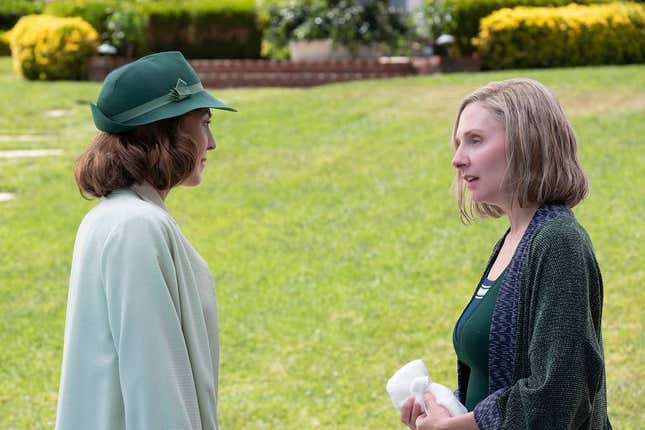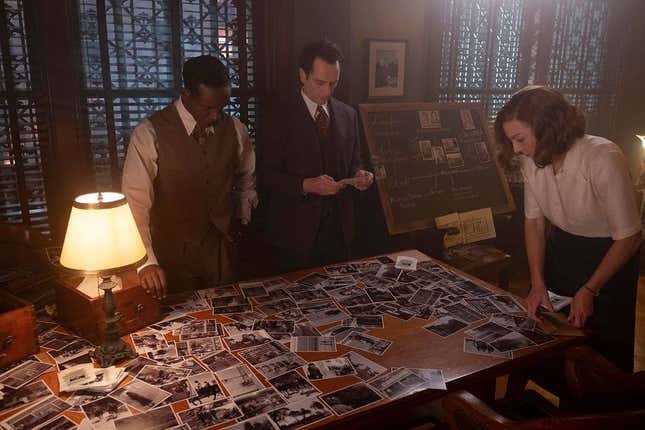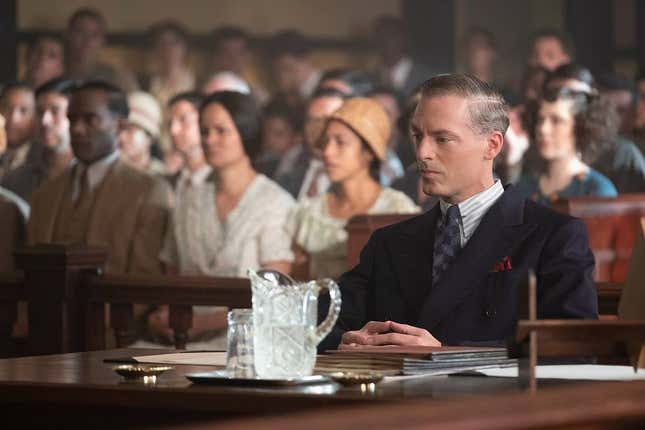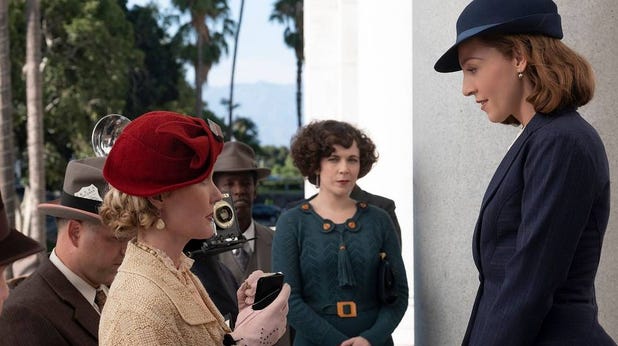Die Wahrheit ist eine komplizierte Sache. Als wir zum ersten Mal in dieser Saison aufgebrochen sind Perry Masonwandten wir uns einem Zitat aus Erle Stanley Gardners 16. zu Mason Roman, Der Fall des Köderhakens, um zu veranschaulichen, wie Perry es traditionell sieht. „Die Wahrheit ist die mächtigste Waffe, die ein Mann benutzen kann, und wenn man das Gesetz so praktiziert wie wir, ist es die einzige Waffe, die mächtig genug ist, um sie einzusetzen“, sagt Mason. „Ein Anwalt, der die Dinge tut, die ich getan habe, und sich auf etwas weniger Mächtiges als die Wahrheit verlässt, würde in einem Monat ausgeschlossen werden.“ Im zurückhaltenden und cool packenden Saisonfinale Perry Mason nutzt die Wahrheit, um einen Mann zu befreien, während er sich selbst ins Gefängnis schickt.
Bezirksstaatsanwalt Hamilton Burger sieht das etwas anders als Mason. Wie in „Kapitel neun,DA Burger sieht sich als Hüter der „Illusion von Gerechtigkeit“. „Trotz all Ihres grüblerischen Zynismus“, sagt Burger zu Mason,
„Du glaubst immer noch an Gerechtigkeit. Burger arbeitet in einem „großen beeindruckenden Gebäude, das aussieht, als wäre es schon 500 Jahre dort gewesen; sechs dort gewesen.“ Schließlich, als würde er sich als Zyniker outen, fragt er Mason: „Weißt du nicht, was wir inzwischen verkaufen? Es gibt keine Gerechtigkeit, nur die Illusion von Gerechtigkeit. Die Fantasie, die die Menschen glauben lässt, dass die Wahrheit immer siegt, Bösewichte werden geschnappt, Gute Jungs stecken sie weg.“ Solange das System „so aussieht, als ob es funktioniert“, macht Burger genau das, wofür ihn die Stadt bezahlt. Am Ende der Saison hat Perry die Dinge besser im Griff und behauptet, dass „Gerechtigkeit“ keine Illusion ist. Es ist das System. Die „Hall Of Justice“ bedeutet nichts anderes, als den Anschein von Macht zu erwecken. Die Architektur des Gebäudes ist symbolisch und signalisiert den Bürgern, dass die Gerechtigkeit ewig ist und die Menschen innerhalb seiner Mauern wissen, was sie tun. Aber diese Fassade aufrechtzuerhalten, ist eine gefährliche, hässliche Angelegenheit. Es erfordert Schmerz und Opfer für Gute und Böse.
Wie Burger trägt auch Camilla Nygaard eine weniger altruistische Maske und glaubt, dass „wir tun, was wir tun müssen, um zu werden, wer wir sind“. Diese Kosten nehmen eine groteske neue Dimension an, wenn wir uns die Eröffnungsaufnahmen der Episode ansehen. Bienenstichbehandlungen heißen uns zum Finale dieser Woche willkommen, bei dem Camilla die Hautpflegeroutine durchführt, die sie glamourös aussehen lässt – nicht die Art von Person, die den Japanern verbotenes Öl verkaufen könnte. Ihre Begleiter verlassen sie mit einer rosa Maske über dem Gesicht, Blumenblüten über den Augen und grüner Creme auf Nase und Lippen. Sein Subtext wurde zum Text. Die Bienenstiche sind das, was Nygaard tut, um den Schein aufrechtzuerhalten, dass sie eine einfallsreiche und wohltätige Millionärin ist, eine Förderin der Künste, die sich nicht weniger um die Gesundheit ihrer Stardarstellerin kümmern könnte, solange ihre Finger die Tasten erreichen.
Those masks work. Camilla fooled Della, who can only see her former mentor as a giving and experienced professional. The aspiring attorney was compromised, too, giving too much of herself to Camilla, who was gathering blackmail on her pseudo-apprentice. She can’t turn the evidence on Camilla over to the cops because it’ll out Ham, and she can’t simply roll over on Camilla without destroying her future. Like many other characters in this episode, Della must sacrifice her immediate future to help her client.
Paul and Clara arrive at Perry’s office with irrefutable proof that Phippsy’s wife was buying heroin off Ozzie, leading Brooks’ murder right back to Camilla. Left with no option, Della betrays Burger’s confidence and tells Perry and Paul that Camilla is blackmailing the D.A. with illicit pictures. Maybe they could cut a deal if they can get the evidence to Burger, but Judge Durkin is all but certainly going to declare a mistrial over the murder weapon fiasco. Perry needs more time, and he’s willing to trade the only thing he’s got for it: His freedom.

As conflicted as Della is, Milligan’s ready for a vacation and another case. As he sits in Ham’s office, Milligan gloats, demanding a promotion and a holiday. The illusion of justice was worth breaking into Mason’s office over—no matter how much it jeopardizes the DA. There’s no use thinking about what could have happened had he been caught because he wasn’t. He’s basically a sentient “Hall Of Justice,” a walking, talking example of the system working. But to Burger, the magic show is starting to grow tired. The case was risky for Burger, but even with Milligan’s sloppy handling, the D.A. dodged a bullet. It isn’t fair, but no one said justice had to be fair.
Fairness is a funny thing on this show. The streets aren’t fair, says Paul to Ozzie. It simply “is what it is.” Yet, Perry appeals to the judge in an “off-the-record” plea to Judge Durkin, saying that the only way the brothers will get a “fair” trial is if they have “competent” counsel. While it’s an easy layup for Durkin, he agrees Perry is the Gallardos’ best shot at a fair trial, and as “being fair is a small detail of a judge’s oath,” the judge agrees. In lieu of a mistrial, the gun will be made admissible in the case, but the prosecution cannot tell the jury how or where it was found—only that it was found at the Hooverville. In return, Perry will do four months in prison for concealing evidence, granting him a little more time to shore up this thing.
Despite having somewhat good news, Perry and Della don’t get far with the Gallardos in prison. The brothers are ready to write their wills and make final arrangements. Rafael is more concerned that his corpse won’t be dumped into a mass grave than attending art school. It’s clear on Rhys and Rylance’s faces. This is their last shot.

For his final argument, Milligan continues to slander the Gallardos, appealing to the jury’s media-back biases, saying they’re “guests” in the country who took the easy way out, circumventing all the hard work that a son of a millionaire like Brooks McCutcheon had to do. Perry takes a different approach. He talks about the famed “illusion of justice.” The jury “had predetermined views when you swore an oath to be impartial,” which isn’t a judgment. This is a fact of life. We can’t be objective without bumping into biases, prejudices, and opinions. Within the system’s framework, justice, fairness, or whatever you want to call it, is impossible without at least first facing those things. The speech is one of the more heavy-handed moments of the season—though Rhys underplays it beautifully, turning the energy down when he should be resting the case in a typical Perry Mason show of legal force. Instead, he reveals a truth at the show’s core: We cannot judge a person’s actions without looking at the circumstances that led them there.
The series spent the last season deepening these characters, revealing various sides of the personalities, and giving them tangible things to lose if the case doesn’t work out. But most of all, the series showed how jury trials thrive on predetermined biases, like the ones Milligan clings to in his closing statement. The show presented the Gallardos as characters deeper than their crime. One is an artist, the other a father, and both lost their future and their family when Brooks decided to build a stadium. Yet the one behind this whole mess still wears a mask, shielding her behind the predetermined biases that benefit the rich and powerful. Camilla Nygaard has been out in the open all season, and it’s a testament to how successfully the show weaponized Paul Racci as Lydell, the labyrinthine politics of Los Angeles, and the predetermined biases of viewers that she was barely considered a suspect. She benefited from what Perry is talking about and used bee stings, a partner’s disposable failson, and a well-meaning law clerk to get there.
The defense may have rested its case, but it’s far from over. Perry has a little more time to save the brothers and knows who to lean on. At poor Phippsy’s house, Perry, Paul, and Della find Camilla’s attorney tending to his wife’s heroin withdrawals. Now at the end of his rope with Camilla, Phippsy agrees to get the Burger pictures. However, after suffering one last humiliating sting from Camilla on his way out with the pictures, Phippsy turns around, grabs her trove of blackmail photos, and delivers the evidence to the defense. Camilla has been keeping tabs on all of them, storing photos of Della and Anita and Perry and his son. Perry brings the pictures to Burger’s office, hoping to strike a deal. Ultimately, Burger agrees to give Brooks’ shooter, Mateo, a 30-year sentence and Rafael a chance at life.

The Gallardos trial doesn’t end with the high drama of a classic Perry Mason; Lydell McCutcheon doesn’t break down and confess on the stand; Perry and Della don’t laugh and deliver a final button for the episode to end on. Instead, the last few sequences reflect how most justice plays out: Through backroom deals between prosecution and defense. Burger says the case had too much attention, so someone has to take the fall. To that end, Mateo’s confession is bittersweet. A brief flashback takes us back to that night, where we can see the determination and conflict in his eyes as we hear Mateo tell of the promise of a better life that McCutcheons took from them. Is it fair that he goes to jail while Brooks is made a martyr?
Perry, for his part, considers the plea a victory. As Della rattles off a list of crimes they committed in order to win the case, Perry concedes it’s not the illusion of justice but the system that’s an illusion. As done in the Hall, justice is deal-making that keeps the powerful in power. Perry had the truth on his side, but getting the truth out ultimately cost him four months of his freedom. Maybe justice will find Lydell and Camilla, who last see with walls closing in around them. Maybe it won’t.
Appropriately, Pete sees Perry off to jail, offering him a pack of smokes and some gum as a comfort for the fate Pete handed him. The two feel okay with the resolution. That’s the job, right? Perry’s sacrifice kept two men from the gallows, freed an innocent, and uncovered a criminal operation that goes to the top of the city. And yet, Perry doesn’t look like the victor. He’s the same downtrodden schmo, dreaming of autumn when he can see Ginny and his son again. We end the season with a shot of Perry Mason, the last good defense attorney in town, in jail. He places a photo of his son on the wall, a son whose life will inevitably be harmed by his father’s pursuit of truth. The illusion of justice, who wants any part of that?
Stray observations
- Title Card Corner: The final one of the season is so indicative of the whole. Perry and Della put in the work, struggling over answers and trying to live up to the big name between them. It’d be a great shot without the card, but damn if it doesn’t look spectacular.
- When Perry approaches Judge Durkin at the shoeshine, he asks the judge if The Good Earth has a happy ending. This scene is another example of the show using everything at its disposal. The book becomes a point of connection between Perry and Judge Durkin, closing the loop on their relationship. Whether or not it has a happy ending is irrelevant because, like this season of Mason, a happy ending can mean a conclusion that’s only slightly better than the worst-case scenario.
- I was happy to see Ozzie wasn’t killed by Perkins’ gang. Now that was a genuine surprise.
- Pete peeing in Milligan’s Napoleon bottle shows that Pete’s craftier than we think. And grosser.
- I’m really looking forward to the inevitable shipping of Pete and Perry. They really had crackling chemistry this season. It felt only right that the last scene would be between these two.
- Perry’s final words to Pete are pitch-perfect: “See you around, fucko.”
- That’s a wrap on season two of Perry Mason. Thank you so much for reading, commenting, and watching along with me. In case you couldn’t tell, I thought this was a significant improvement from last year. More than anything, I thought they presented a modern interpretation without having to highlight everything they were doing differently. Rather than actively subvert Mason tropes, Jack Amiel and Michael Begler found ways to complicate the case and character, bringing real-world politics and limitations to a title that thrived as a procedural that only skimmed the surface of the titular character. By digging into Perry, Paul, and Della’s character, they became characters we cared about, who we wanted to see win. I hope we get many more trials with these three.


